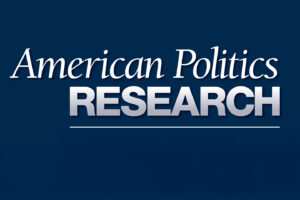
The views expressed are those of the author and do not represent the views of the SNF Agora Institute or Johns Hopkins University.
Author: Hahrie Han, Geoff Henderson
Abstract
Americans’ sense of external political efficacy—their belief in their ability to influence government decisions. Scholars have long argued that involvement in civic associations can help ordinary Americans realize their political efficacy, yet a lack of longitudinal data on association members’ attitudes and behaviors has impeded efforts to test this claim. To collect such a dataset, we partnered with a national environmental association to conduct a unique panel study of members of eight state-level organizations. We show that members who get to know their association’s leaders believe that they have greater influence over government decisions. Our findings suggest that civic associations can strengthen their members’ efficacy by cultivating volunteer leadership and fostering relationships between members and leaders.
Introduction
Americans’ perceptions of their external political efficacy—their ability to influence government decisions—are central to their decisions about whether to take part in all kinds of collective action, from voting to protest (Finkel, 1985</a>; Hirsch, 1990</a>; Moe, 1981</a>; Olson, 1965</a>; Verba et al., 1995). Many Americans do not participate in politics because they do not believe their participation will make a difference. In recent decades, Americans’ external efficacy has declined precipitously, posing a threat to the vibrant public engagement that democracy requires (Kellman & Swanson, 2017</a>; Putnam, 2000). Growing disaffection with government has dovetailed with a decades-long process of disengagement from political and civic life (Putnam, 2000</a>; Rosenstone & Hansen, 1993</a>; Skocpol, 2003).
Scholars have long suggested that involvement in civic associations can help ordinary Americans discover their efficacy as political actors (Christens et al., 2011</a>; Han, 2014</a>; Osterman, 2006</a>; Warren, 2001). Prior research has established the link between association membership and political participation, suggesting efficacy as a possible pathway through which participation becomes more likely (Cassel, 1999</a>; McFarland & Thomas, 2006</a>; Olsen, 1982</a>; Rogers et al., 1975</a>; Sobieraj & White, 2005</a>; Verba & Nie, 1972). Likewise, scholars have found that involvement in civic associations facilitates the development of civic skills which can be applied to political activity (Brown & Brown, 2003</a>; Terriquez, 2011</a>; Verba et al., 1995).
We still need further analyses to better understand the relationship between civic associations and people’s efficacy, however, and the kinds of experiences within civic associations that are most likely to shape efficacy. In many cases, a lack of longitudinal data on members’ experiences after they join civic associations has impeded efforts to examine this relationship. This study draws on an original panel dataset of several hundred environmental association members to explore how various forms of involvement in a civic association affect members’ external political efficacy. This dataset allows us to examine trajectories of people’s participation over time. The association in our study is typical of national civic associations in the United States, particularly as a voluntary organization with a democratic and federated governance structure and an orientation toward a public purpose. We find that relationships with leaders increase external efficacy among association members. In other words, members who get to know their association’s leaders believe that they have greater influence over government decisions.
